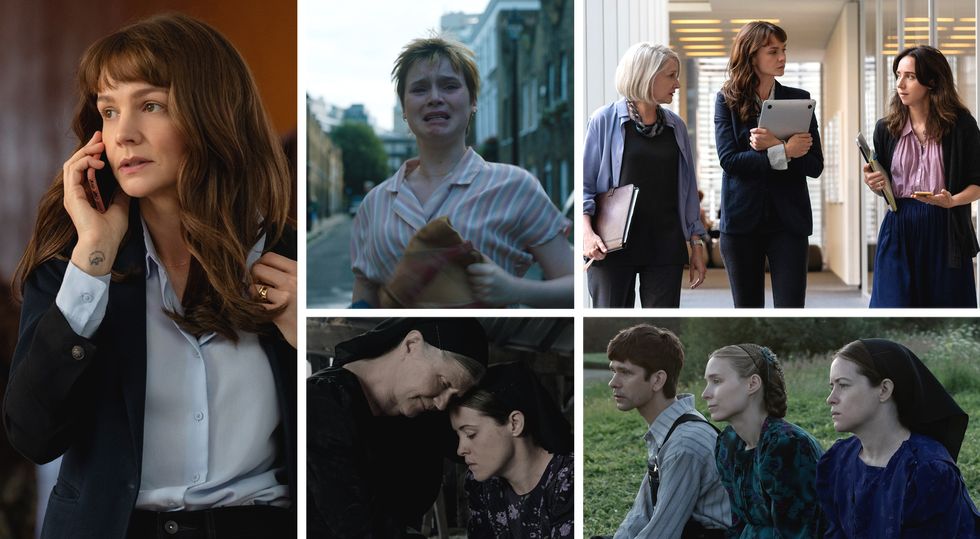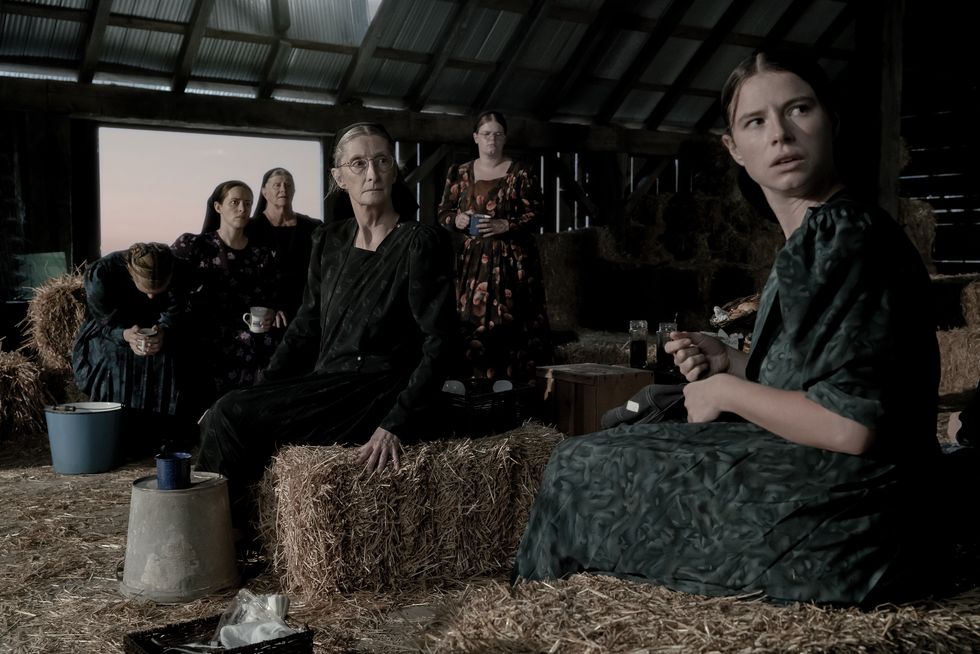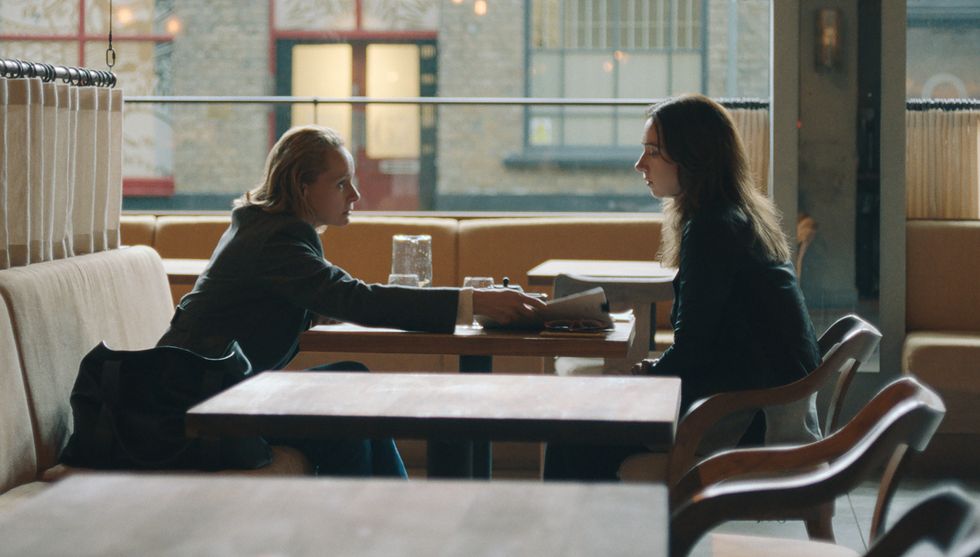Women Talking, She Said, and Thinking About Trauma Onscreen
Warning: This story discusses sexual assault.
If you or someone you know is affected by sexual assault, contact the National Sexual Assault Hotline at 800-656-HOPE (4673) or visit rainn.org for support online.
More than five years post the explosion of #MeToo, we are still talking about sexual assault. This is a good thing—sexual violence is a horror in all our communities, and for years, much of it has been a secret. With any problem, the first step is to acknowledge it. To say it. Two recent films, Women Talking and She Said, are continuing this conversation onscreen in new, vital ways, and deserve the awards and praise both are receiving. The film’s titles echo each other in literal and thematic ways, as both are about the importance of language around trauma. She Said implicitly references the too-common dismissal of women’s accusations of rape: “It’s just he said/she said.” Both stories are based on books—Women Talking, a novel by Miriam Toews, and She Said: Breaking the Sexual Harassment Case That Ignited a Movement by The New York Times’ journalists Jodi Kantor and Megan Twohey—and both are also born from reality—Women Talking was inspired by actual events in a Bolivian Mennonite community, and She Said tracks the Times’ work to expose Oscar-winning producer Harvey Weinstein’s decades-long predation. I wrote a memoir, Being Lolita, about my own experience as a victim of grooming and sexual violence, so abuse is a subject I have some experience with. Yet the complexity of these women’s voices onscreen was startling and I found myself unpacking them both, separately and together, for days on end.
Portraying trauma in art has always been complicated—especially if it involves a woman. Both films explicitly address the way sexual violence explodes a self, leaving a wake of destruction. I was victimized by a high school English teacher when I was 17, and it irrevocably damaged me. In a scene in She Said, when one of Weinstein’s victims is opening up about her traumatic sexual experience, she says plainly: “It changed the direction of my life.” As she described leaving filmmaking, a career she loved, and finding herself adrift, I felt a familiar pressure return to my chest. The process of writing my book was peeling away at an onion of pain: under the layers of shame, anger, and sadness was grief. Grief at the loss of who I might have been had I not been harmed in such a destructive way at such a vulnerable moment in my life. In Women Talking, Rooney Mara’s character Ona, an unmarried woman pregnant via one of her attackers, says, “I used to miss the person I might have been.” I don’t think I was the only woman in the theater who still traces that loss of who we could have become, who feels the scar.
In neither movie do we ever see the faces of the predators or scenes of rape. We only see shadows of the Mennonite men and Harvey Weinstein from behind, keeping our focus—rightfully so—on the women. It is the victims who we have the hardest time facing, acknowledging what was done to them and how little we do to protect women in this country. Women Talking and She Said force that gaze, which is uncomfortable and unfamiliar but necessary, and not without compassion both to the characters and audience. We are never forced to watch the violence against these women, a quiet kindness I, as a victim of violence, deeply appreciated. No matter how carefully done, recreating these acts sensationalize and sexualize this very real trauma. And by now, is there even anything we haven’t seen before, many times over? It is far more scandalous to do what these movies are—grappling with the aftermath of violence, to reckon with what remains, and what was taken.
Women Talking, directed and written by Sarah Polley, opens with a sentence onscreen, “What follows is an act of female imagination,” and ends with a chorus of women singing a hymn as the credits roll. I left the theater asking myself what was the imagined part—the ability for women to make a choice? That victims have any real power at all? It certainly wasn’t that this level of horror remains all too possible. The story dramatized in She Said is old news in Hollywood, with backlash on every horizon. While the #MeToo movement told us that simply speaking aloud experiences of violence and abuse would provide power, few men faced true consequences. But both films are in many ways optimistic, leaving us on moments of hope that a world where women can be safe is possible. In a world where that hope is still not earned, this is a radical act.
Time is described by the sun’s rise and set in the insular world of Women Talking, with the return of the men the following day serving as the urgent engine of this conversation. After extended sexual abuse experienced at the hands of their sons, brothers, husbands, the community’s women must decide as a group what to do next. The movie takes place mostly in the cramped setting of a hayloft where the women meet and talk, and talk. The horrific violence which occurred in this idyllic, quiet world has split the community, and no matter how green the grass is in the surrounding fields or beautiful the sun, everything is muted almost to the point of black and white. When we see flashbacks to the mornings after these attacks, the blood we see on the women’s white nightgowns is darkened; a rusty, old hue. There is nothing new about this kind of violence. Nor how it is undermined by the men in power of the community. We are told in voiceover, “When we woke up, feeling hands that were no longer there, the elders told us that it was the work of ghosts or Satan or that we were lying to get attention.” In my own experience of sexual assault, while it was never suggested to me that I was raped by a ghost, I was called a liar.
She Said, written by Rebecca Lenkiewicz and directed by Maria Schrader, has a clarity of cinematic perspective that aligns with the investigative journalism it depicts. It looks back to 2017, when reporters Megan Twohey and Jodi Kantor, played richly by Carey Mulligan and Zoe Kazan, work to capture the long history of Harvey Weinstein’s sexual abuse in a Pulitzer Prize-winning series for The New York Times. Their journey is re-created without overt fanfare: many scenes are filled with only dialogue and diegetic sound, and the grime of New York City and a hectic newsroom are shown without filter. The process is frustratingly slow at times as they attempt to verify facts and follow leads to their ends, the dogged work of reporting. She Said, at its core, is the struggle of two women trying to do exactly as its title prompts: convince victims of his terrible behavior to go on the record and to expose his violence. These women have good reason to believe they will be threatened and discounted if they speak, notwithstanding the difficulty of publicly facing their trauma. As Kazan’s Kantor says, “It’s hard to ask women to talk.”
Both films give a clear-eyed look at the forces used to silence these women. In the Mennonite community, there is not just shame of sexual contact out of wedlock, of being made a whore, but the real threat that if they do not forgive the men who attacked them they will be excommunicated, forced to leave their families, and not allowed entry to heaven. In a modern, capitalist society, our Kingdom of Heaven is money, so the nondisclosure agreements that Weinstein victims signed were an effective tool for silence. If they broke the gag orders, not only would they have to return the settlements they’d received, but they would owe damages and be forced to cover Weinstein’s own legal fees. This sort of monetary threat is terrifying. As someone who has signed an NDA, it isn’t that my silence was bought off—it’s the very real threat of bankruptcy I face if I speak out.
We are in a new era of feminism that’s defined by language, with a definite shift in the way we talk about gender, power, and sex. We continue to try and navigate these changes, somewhat messily. Consent is no longer flattened to “no means no,” we recognize people are more than just their biological sex, and many of the whisper networks of abuse that run through women’s worlds have grown to screams. All of these cultural steps forward are made possible by women’s voices; speaking out has changed from a liability to a source of power. Both She Said and Women Talking are thinking and, yes, talking about this power, placing it in narrative containers and holding it up for us to see. There is ample overlap which serves to deepen this conversation, not shrink it. After all, we’ve seen that women talking is most powerful when there is more than one voice.



